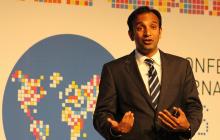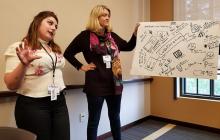OpenConcept is a pretty small company and most of our services we consume are digital, so in the scheme of things, we have a pretty small footprint on our planet and our local economy. That being said, as Mahatma Gandhi said “Whatever you do will be insignificant, but it is very important that you do it."
I just returned from my second B Corp Champions Retreat and I am even more enthusiastic about being able to leverage our small contributions to make a much bigger impact. I believe strongly in fixing the problems at the source, and many of our societal problems boil down to consumption...
Open Source
By Mike Gifford
on 13/06/2017

Originally posted on LinkedIN in two parts.
Building Digital Inclusion into Organizations
There are an increasing number of organizations that are looking to make their organizations more inclusive to People with Disabilities (PwD). Some organizations do this because they are seeking talent, others because of ethics and still others because it is the law. There are lots of little steps that any organization could do to include more people with disabilities. This is a description of an approach for an organization that wanted to demonstrate leadership.
Accessibility is a big field and although...
Building Digital Inclusion into Organizations
There are an increasing number of organizations that are looking to make their organizations more inclusive to People with Disabilities (PwD). Some organizations do this because they are seeking talent, others because of ethics and still others because it is the law. There are lots of little steps that any organization could do to include more people with disabilities. This is a description of an approach for an organization that wanted to demonstrate leadership.
Accessibility is a big field and although...
By Mike Gifford
on 12/06/2017


Originally posted on LinkedIN in two parts.
The Government of Canada’s Web Renewal Initiative has failed. It may not be public yet, but there really is no way to redeem this half-conceived initiative to centralize all government pages onto a single website - Canada.ca.
This goal was lifted from the UK Government’s Government Digital Services (GDS). The goal of the GDS team was no less than digital transformation. Our government appears to have mistaken the alpha.gov.uk site as the end goal, rather than a platform with which to experiment with new ideas in government usability. The GDS is...
The Government of Canada’s Web Renewal Initiative has failed. It may not be public yet, but there really is no way to redeem this half-conceived initiative to centralize all government pages onto a single website - Canada.ca.
This goal was lifted from the UK Government’s Government Digital Services (GDS). The goal of the GDS team was no less than digital transformation. Our government appears to have mistaken the alpha.gov.uk site as the end goal, rather than a platform with which to experiment with new ideas in government usability. The GDS is...
By Mike Gifford
on 02/12/2016


This article was initially posted as a guest blog on The Digital Echidna Blog on November 29, 2016.
So you’ve gone all out on making your website accessible. You considered accessibility at every stage of your project. You started by choosing Drupal. You then evaluated the wireframes for potential problems, took careful consideration that the colours had sufficient contrast, had your developers do regular accessibility checks with every sprint, brought in an external reviewer at the end of the project to evaluate your work, etc.
It was the textbook example of how you should approach building...
So you’ve gone all out on making your website accessible. You considered accessibility at every stage of your project. You started by choosing Drupal. You then evaluated the wireframes for potential problems, took careful consideration that the colours had sufficient contrast, had your developers do regular accessibility checks with every sprint, brought in an external reviewer at the end of the project to evaluate your work, etc.
It was the textbook example of how you should approach building...
By Mike Gifford
on 09/10/2016
Recently I was asked if there were any products or services that would give users equivalent or greater accessibility than WCAG 2.0 Level AA. This is part of the feedback process for a report on web accessibility for state and local governments.
In addressing this I wanted to make it clear that, at the root accessibility is about eliminating barriers to communications. Tim Berners-Lee saw the potential for the web being a great equalizer as it could allow people to communicate in a way which was completely inclusive. In practice, the web has evolved to provide barriers to 10-20...
In addressing this I wanted to make it clear that, at the root accessibility is about eliminating barriers to communications. Tim Berners-Lee saw the potential for the web being a great equalizer as it could allow people to communicate in a way which was completely inclusive. In practice, the web has evolved to provide barriers to 10-20...
By Mike Gifford
on 06/07/2016


This article was initially posted on July 5, 2016 in the Ottawa Business Journal.
Justin Trudeau arrived at the White House in March for his first official visit as prime minister at the exact time as the White House announced its release of a draft policy for the U.S. federal government on reusable and open-source software.
A coincidence, sure, but in this information age, it highlights how far behind Canada is in adopting a forward thinking open-source software policy.
The U.S. government is very clear on this.
“By harnessing 21st century technology and innovation, we’ve found new ways to...
Justin Trudeau arrived at the White House in March for his first official visit as prime minister at the exact time as the White House announced its release of a draft policy for the U.S. federal government on reusable and open-source software.
A coincidence, sure, but in this information age, it highlights how far behind Canada is in adopting a forward thinking open-source software policy.
The U.S. government is very clear on this.
“By harnessing 21st century technology and innovation, we’ve found new ways to...
By Mike Mallett
on 10/02/2016


What is GlusterFS?
GlusterFS is a distributed network filesystem. It acts as a file system which can be attached to a server for storage like any other, but using network sockets it can be configured in a variety of ways to distribute the files across a number of disparate servers simultaneously and in a fashion which is transparent to users.
It can be deployed to replicate the same data across multiple servers (sort of like RAID mirroring), or bring together the free space of multiple servers into a single large volume (sort of like RAID striping), or distribute data across a WAN using "geo-...
GlusterFS is a distributed network filesystem. It acts as a file system which can be attached to a server for storage like any other, but using network sockets it can be configured in a variety of ways to distribute the files across a number of disparate servers simultaneously and in a fashion which is transparent to users.
It can be deployed to replicate the same data across multiple servers (sort of like RAID mirroring), or bring together the free space of multiple servers into a single large volume (sort of like RAID striping), or distribute data across a WAN using "geo-...
By Mike Gifford
on 04/01/2016


This article was written for the 2016 Masdar Blog Contest.
I’ve been passionate about sustainability my entire adult life, all of which we have surpassed the earth's carrying capacity.
When started my business, OpenConcept Consulting Inc., my initial inspiration was to build collaboration within the not-for-profit sector. It was clear to me that many of the organizations world could be more effective if they were able to better collaborate. I saw open-source technology as a means to both advance their missions, and experiment with new ways of work together.
Over the years we have done more...
I’ve been passionate about sustainability my entire adult life, all of which we have surpassed the earth's carrying capacity.
When started my business, OpenConcept Consulting Inc., my initial inspiration was to build collaboration within the not-for-profit sector. It was clear to me that many of the organizations world could be more effective if they were able to better collaborate. I saw open-source technology as a means to both advance their missions, and experiment with new ways of work together.
Over the years we have done more...
By Mike Gifford
on 23/10/2015

Stephanie Daniels sums it up well, "Optimized sites are better for the environment. That’s because they’re significantly faster, more usable, with content that’s optimized for SEO and user experience. It’s my belief that Drupal has all of the tools in place to create sustainable websites…if you just know where to look.".
If only I had Drupal back in 1995. That was the year I built my first website for a Fair Trade Retailer called Bridgehead. Back at this time, the Internet was a very different place. People were using the web at that point, but it wasn't embedded in our lives like it is now...

Stephanie Daniels sums it up well, "Optimized sites are better for the environment. That’s because they’re significantly faster, more usable, with content that’s optimized for SEO and user experience. It’s my belief that Drupal has all of the tools in place to create sustainable websites…if you just know where to look.".
If only I had Drupal back in 1995. That was the year I built my first website for a Fair Trade Retailer called Bridgehead. Back at this time, the Internet was a very different place. People were using the web at that point, but it wasn't embedded in our lives like it is now...
By Mike Gifford
on 08/10/2015


PDFs have served their purpose, but it is time to stop using them. Just as they have become convenient to use they have outlived their usefulness. PDFs need to be seen as the liability that they are.
PDFs were intended to be a Portable Document Format. Something that anyone could open and read in a common format. It’s been a way more professional way to send a document like a resume or annual report than using Microsoft Word. There are far fewer concerns about virus’ or version numbers and it generally managed to lock in the look of the page.
I’ve been opposed to PDFs for a long time because...
PDFs were intended to be a Portable Document Format. Something that anyone could open and read in a common format. It’s been a way more professional way to send a document like a resume or annual report than using Microsoft Word. There are far fewer concerns about virus’ or version numbers and it generally managed to lock in the look of the page.
I’ve been opposed to PDFs for a long time because...

